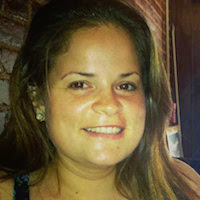Check out the second part of this two-part interview to hear more about Debbie’s journey out of BPD hell.
There aren’t many faces advocating on behalf of borderline personality disorder.
Certainly not in the way that Demi Lovato and Catherine Zeta-Jones have used their global stage to shed light on bipolar disorder.
Borderline personality disorder, known as BPD, is a highly stigmatized and often misunderstood disorder—the mental health equivalent of the ugly step-sister. Lady Gaga has been rumored to have BPD, based on her own public disclosures regarding mental health, but she has never confirmed this on a public platform.
During my own time in group therapy, I have met and befriended a number of people with BPD, noting that even within a therapeutic context, their diagnosis is often left undisclosed even while among their peers.
Blogger and author Debbie DeMarco Bennet is breaking this mold. Debbie publicly chronicled her journey through BPD hell and into recovery. After years of suffering through hospitalizations, periods of homelessness, conflict-ridden relationships, and the inability to hold a job, Debbie was diagnosed with BPD.
Upon receiving the diagnosis, Debbie committed herself to fully embracing Dialectical Behavior Therapy (DBT), the primary evidence-based treatment for BPD. Through determination, grit, and a tremendous amount of willingness, she went into remission within two years, having BPD officially removed from her diagnosis. Debbie has gone on to create “DBT Path,” a psycho-educational program designed to teach students from around the world how to implement DBT skills in their own lives.
Here is more about Debbie in her own words.
Alyssa: For readers who are hearing about borderline personality disorder for the first time, how would you describe it?
Debbie: When you have BPD, you tend to experience the world more intensely than others. Your thoughts, emotions, and reactions tend to be strong and often out of proportion to the trigger or issue that has set off the emotion. You might also find that you see the world in extremes, known as all-or-nothing or black-or-white thinking. For example, you might think highly of someone when everything is going smoothly, but if the person lets you down in any way, you might have a hard time remembering their good qualities and see them as all bad. Though not all people who have a BPD diagnosis identify as having had trauma, many people with the diagnosis have experienced trauma or attachment issues with their primary caregivers, initiating a strong fear of abandonment and rejection.
Alyssa: Dialectical Behavior Therapy is recognized as the premier treatment for BPD. What was your life like before learning those DBT skills?
Debbie: Oh, goodness. Not so great. I would have periods of about three to six months of being stable. I could stay in one place, keep a job, have friends, and then I would inevitably spiral. Someone would say the wrong thing at work, and I’d quit because I saw that as my only choice. I’d check myself in and out of in-patient and outpatient psychiatric hospitalizations because I felt crazy and didn’t know how to manage all that I was feeling. I believed a lot of my thoughts without checking the facts and was frequently responding to past trauma rather than what was happening in real-time. DBT has really changed my life for the better in that I have learned how to notice, be with, and manage my emotions so I can be a high-functioning, emotionally sensitive person in recovery from BPD (I no longer meet the diagnostic criteria) and with BPD traits.
Alyssa: Was there ever a point that you felt discouraged or hopeless to manage your mental health challenges and have a life worth living?
Debbie: Yes, prior to DBT I had frequent episodes of thinking I wanted to die. I checked myself into the hospital for suicidal thoughts. In retrospect, I realize that I didn’t really actually want to die, but I wanted to end the painful state of my life at the time but had no idea how. Expressing suicidal thoughts, for me, I think, was my psyche’s way of communicating to others how badly and desperately I was feeling. And it worked, so I kept doing it, but eventually, with DBT skills, I didn’t have to go to that extreme and learned healthier ways to communicate what’s happening for me, what I need, and to become more self-sufficient in my own emotion management.
Alyssa: What would you say to someone newly diagnosed with BPD?
Debbie: There is hope! It was once thought that those with BPD could not be treated. We now know that this is absolutely not the case and that it is possible to go into remission/recovery and no longer meet the diagnostic criteria to have the diagnosis anymore. At this point, you may still have traits but can manage them. Modalities like Dialectical Behavior Therapy (DBT) skills can be effective for those wanting to learn to experience and manage their emotions in a healthier way and to begin to build the lives they want to live, no longer letting BPD stand in the way.
Alyssa: Have you ever wondered about the overlap between where Debbie DeMarco Bennett begins and where BPD traits end?
Debbie: Yes! For years I made BPD my identity. I struggled with identity issues as a component of BPD, so taking on the BPD posterchild role gave me a sense of who I was and a purpose to help others. I now know I am a strong, resilient, emotionally sensitive person who has BPD traits. I am not borderline personality disorder, and it, nor its traits, are the totality of who I am.
~
In knowing Debbie, I have been struck by her level of compassion, empathy, kindness, and dedication to help others heal and go on to have robust, meaningful, and fulfilling lives.
Looking in from the outside, living with BPD may seem like finding yourself adrift in a labyrinth deep within the earth’s core that you are desperate to escape. But, finally, there is a person willing to come forward and say, “I have passed this way before, and here is the roadmap out.”
The message reverberates loud and clear: if I can do it, you can do it.
~









Read 9 comments and reply